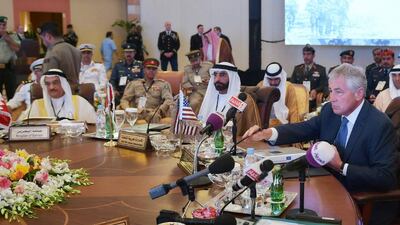Taimur Khan
Foreign Correspondent
NEW YORK // The Saudi crown prince yesterday called for greater military and strategic cooperation between the United States and GCC countries, which he said are threatened by regional instability and Iran.
“We meet today amid persistent threats to the region’s security and stability,” which “necessitate coordination in politics and defence strategies of our countries,” Prince Salman bin Abdulaziz Al Saud, who is also defence minister, said in Jeddah during talks between the US defence secretary Chuck Hagel and his GCC counterparts. “The security of our countries and our people are in danger.”
“Political crises” as well as “attempts to acquire weapons of mass destruction and meddling of certain states”, in a reference to Iran, are among the issues confronting the GCC, Prince Salman said.
Mr Hagel met GCC defence ministers to reassure them that the US has no intention of abandoning its traditional military role in the Gulf as optimism builds over the prospects of US-led negotiations with Iran to end what most world powers consider a nascent nuclear weapons programme.
Riyadh and other Gulf capitals worry that such a deal would allow the US to pursue its “pivot” to East Asia and give Tehran a free hand to pursue regional policies that threaten their interests.
Before yesterday’s meeting, Mr Hagel promised his counterparts that a deal with Iran will not undermine their countries’ security and that the US shares “deep concerns” about Iran’s support for the Syrian regime and its “efforts to undermine the stability in GCC member nations”.
“As negotiations progress, I want to assure you of two things,” he said. “First, these negotiations will under no circumstances trade away regional security for concessions on Iran’s nuclear programme.
“Second, while our strong preference is for a diplomatic solution, the United States will remain postured and prepared to ensure that Iran does not acquire a nuclear weapon – and that Iran abides by the terms of any potential agreement.”
But each GCC country has responded differently to the potential US detente with Iran, and the Iranian foreign minister Mohammad Javad Zarif has visited most GCC capitals for talks since the interim nuclear accord with the world powers was struck in November in an attempt to begin healing bilateral relations with still cautious Arab Gulf countries.
Riyadh has been locked in a struggle with its arch-rival for influence across the region that has played out in the Syrian civil war, Iraq, Lebanon and nearby in Yemen and Bahrain. But fears that it will become isolated as the US and its GCC neighbours improve their relations with Iran may have prompted a rethink of tactics, if not their overall strategy.
“I think much of this is very limited in scope,” said Frederic Wehrey, a Middle East expert at the Carnegie Endowment for International Peace think tank in Washington. “The Saudis sensed that momentum was shifting toward engagement with Iran and they don’t want to cede this momentum to the smaller Gulf states.”
Saudi Arabia appeared to move towards engagement with Tehran on Tuesday after saying it had invited Iran’s foreign minister to visit.
The Iranian deputy foreign minister Hossein Amir Abdollahian on Wednesday welcomed the move but said Tehran had not yet received a written invitation to visit Saudi Arabia.
“Visits of the countries’ foreign ministers are on the agenda of Iran,” Mr Amir Abdollahian said.
Iran and Saudi Arabia support competing sides of the Syrian war, but mounting fears in Riyadh that the conflict is destabilising the region and spreading violent sectarianism and Islamist militancy towards its borders is also likely a factor in the outreach.
But major obstacles to a meaningful detente are unlikely to change, such as the presence of more than 35,000 US troops in the Gulf as well as the Syrian war, Mr Wehrey said.
Cooperation where the two rivals’ interests overlap is not unprecedented, he added, saying, they “have shown the ability in the past to compartmentalise their rivalry, engaging in dialogue and coordination on one geographic or substantive area even while they are competing in others”.
US officials supported the Saudi initiative.
The US secretary of state, John Kerry, said: “We encourage it, we welcome it, and we hope that it might be able to produce something with respect to one of several conflicts in which the Iranians could perhaps have an impact”.
During yesterday’s talks, Mr Hagel also pushed for the GCC to work more multilaterally with the US on regional security rather than individually. Maritime defence and cyber security were part of these discussions, but perhaps most important is missile defence.
US officials hope that the GCC will buy missile defence systems as a bloc, which they view as a more powerful guard against Iran’s ballistic missile programme, which is unlikely to be blunted by a final nuclear deal.
tkhan@thenational.ae

